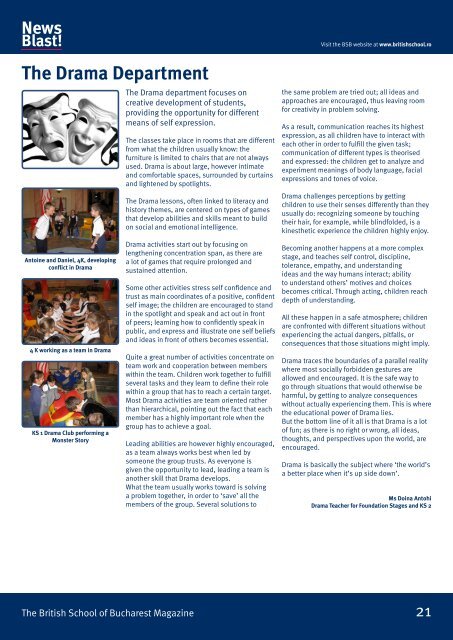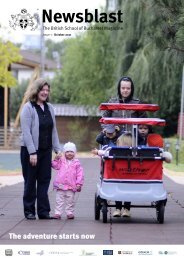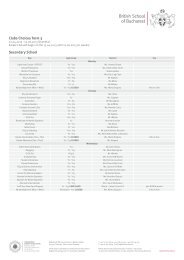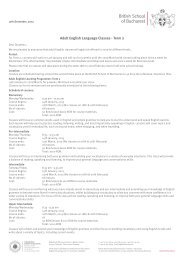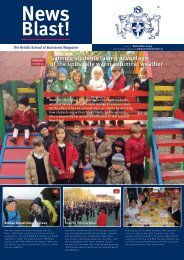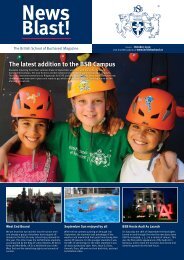November 2008 - British School Of Bucharest
November 2008 - British School Of Bucharest
November 2008 - British School Of Bucharest
You also want an ePaper? Increase the reach of your titles
YUMPU automatically turns print PDFs into web optimized ePapers that Google loves.
Visit the BSB website at www.britishschool.ro<br />
The Drama Department<br />
Antoine and Daniel, 4K, developing<br />
conflict in Drama<br />
4 K working as a team in Drama<br />
KS 1 Drama Club performing a<br />
Monster Story<br />
The Drama department focuses on<br />
creative development of students,<br />
providing the opportunity for different<br />
means of self expression.<br />
The classes take place in rooms that are different<br />
from what the children usually know: the<br />
furniture is limited to chairs that are not always<br />
used. Drama is about large, however intimate<br />
and comfortable spaces, surrounded by curtains<br />
and lightened by spotlights.<br />
The Drama lessons, often linked to literacy and<br />
history themes, are centered on types of games<br />
that develop abilities and skills meant to build<br />
on social and emotional intelligence.<br />
Drama activities start out by focusing on<br />
lengthening concentration span, as there are<br />
a lot of games that require prolonged and<br />
sustained attention.<br />
Some other activities stress self confidence and<br />
trust as main coordinates of a positive, confident<br />
self image; the children are encouraged to stand<br />
in the spotlight and speak and act out in front<br />
of peers; learning how to confidently speak in<br />
public, and express and illustrate one self beliefs<br />
and ideas in front of others becomes essential.<br />
Quite a great number of activities concentrate on<br />
team work and cooperation between members<br />
within the team. Children work together to fulfill<br />
several tasks and they learn to define their role<br />
within a group that has to reach a certain target.<br />
Most Drama activities are team oriented rather<br />
than hierarchical, pointing out the fact that each<br />
member has a highly important role when the<br />
group has to achieve a goal.<br />
Leading abilities are however highly encouraged,<br />
as a team always works best when led by<br />
someone the group trusts. As everyone is<br />
given the opportunity to lead, leading a team is<br />
another skill that Drama develops.<br />
What the team usually works toward is solving<br />
a problem together, in order to ‘save’ all the<br />
members of the group. Several solutions to<br />
the same problem are tried out; all ideas and<br />
approaches are encouraged, thus leaving room<br />
for creativity in problem solving.<br />
As a result, communication reaches its highest<br />
expression, as all children have to interact with<br />
each other in order to fulfill the given task;<br />
communication of different types is theorised<br />
and expressed: the children get to analyze and<br />
experiment meanings of body language, facial<br />
expressions and tones of voice.<br />
Drama challenges perceptions by getting<br />
children to use their senses differently than they<br />
usually do: recognizing someone by touching<br />
their hair, for example, while blindfolded, is a<br />
kinesthetic experience the children highly enjoy.<br />
Becoming another happens at a more complex<br />
stage, and teaches self control, discipline,<br />
tolerance, empathy, and understanding<br />
ideas and the way humans interact; ability<br />
to understand others’ motives and choices<br />
becomes critical. Through acting, children reach<br />
depth of understanding.<br />
All these happen in a safe atmosphere; children<br />
are confronted with different situations without<br />
experiencing the actual dangers, pitfalls, or<br />
consequences that those situations might imply.<br />
Drama traces the boundaries of a parallel reality<br />
where most socially forbidden gestures are<br />
allowed and encouraged. It is the safe way to<br />
go through situations that would otherwise be<br />
harmful, by getting to analyze consequences<br />
without actually experiencing them. This is where<br />
the educational power of Drama lies.<br />
But the bottom line of it all is that Drama is a lot<br />
of fun; as there is no right or wrong, all ideas,<br />
thoughts, and perspectives upon the world, are<br />
encouraged.<br />
Drama is basically the subject where ‘the world’s<br />
a better place when it’s up side down’.<br />
Ms Doina Antohi<br />
Drama Teacher for Foundation Stages and KS 2<br />
The <strong>British</strong> <strong>School</strong> of <strong>Bucharest</strong> Magazine<br />
21


